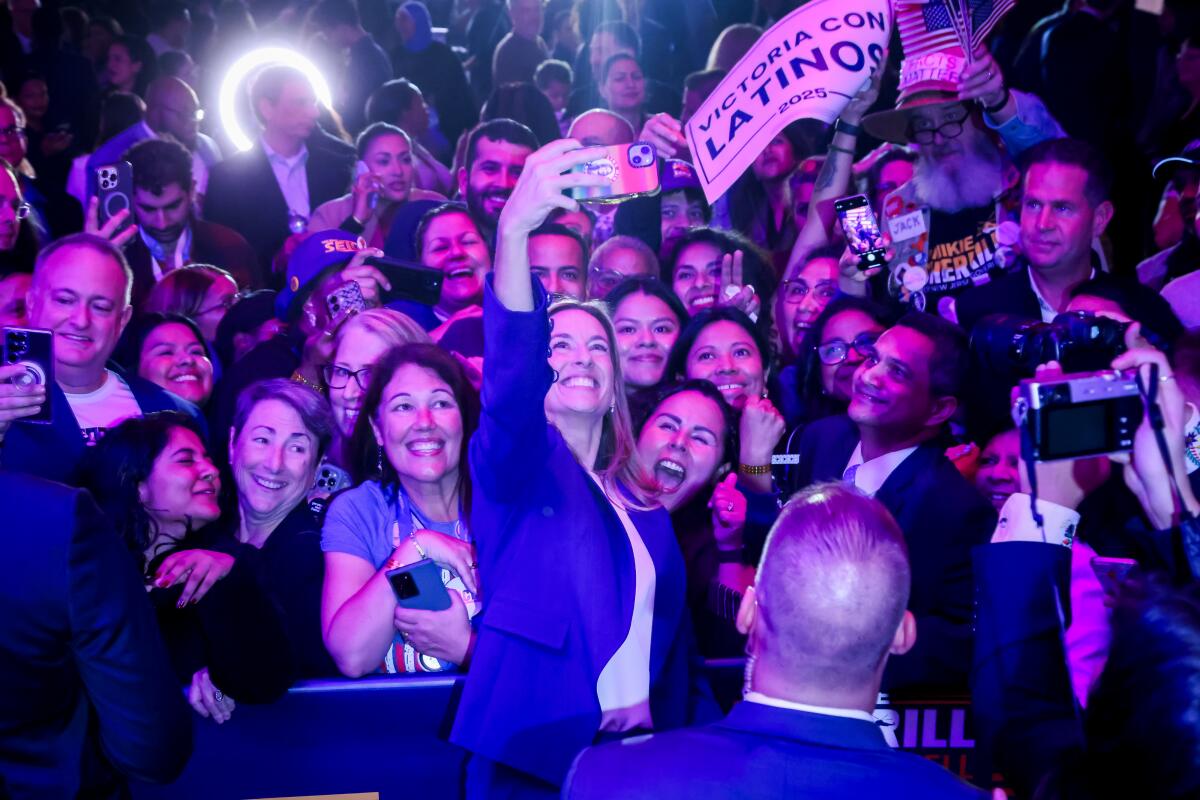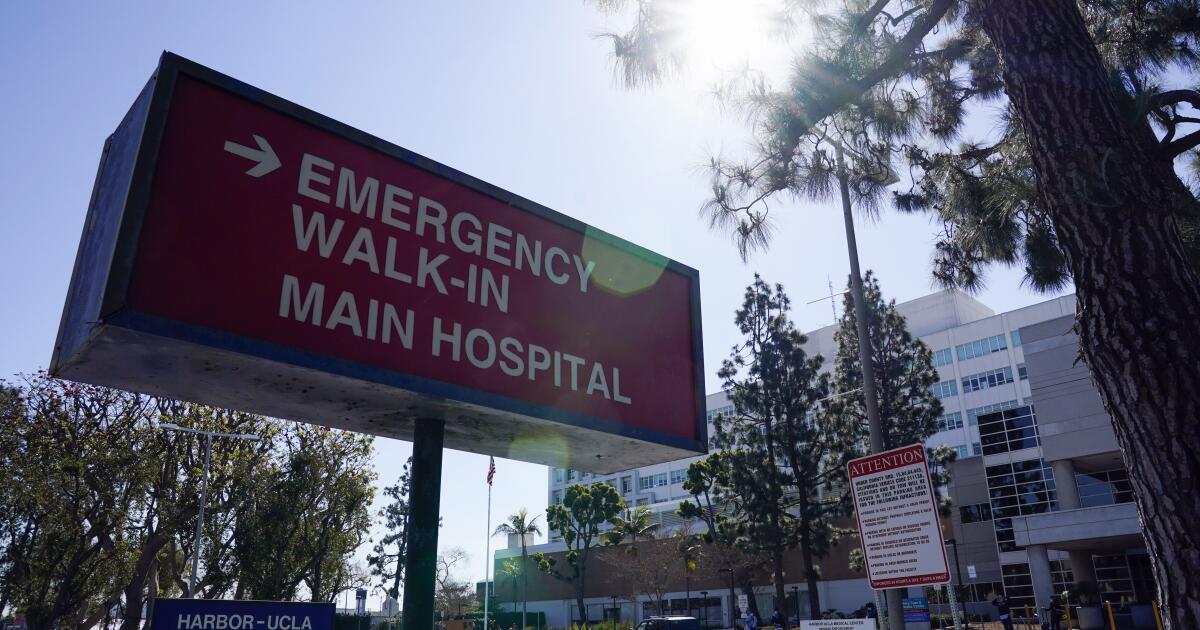Latinos are blowing the whistle on Trump’s reign
CHICAGO — When I turned on my phone after landing at O’Hare Airport on Wednesday, texts poured in from friends and colleagues warning that I was about to enter a region under siege.
Many sent a video from that morning of immigration agents running into a day care facility in Chicago’s Roscoe Village neighborhood to pull out a teacher. It was the latest attack against the metropolis by President Trump’s deportation Leviathan, whose so-called Operation Midway Blitz this fall has made its earlier occupation of Los Angeles look like a play date.
Armed agents have sauntered through downtown and manned a flotilla of boats on the Chicago River. They shot and killed a fleeing immigrant and raided an apartment building with the help of a Black Hawk helicopter. In nearby Broadview, home to the region’s main ICE detention facility, rooftop migra shot pepper balls at protesters below, including a pastor. They even tear-gassed a neighborhood that was about to host a Halloween children’s parade, for chrissakes.
From Back of the Yards to Cicero, Brighton Park to Evanston, immigration agents have sown terror throughout Chicagoland with such glee that a federal judge declared that it “shocks the conscience” and issued an injunction limiting their use of force — which they no doubt will ignore.
I was in town to speak to students at the University of Chicago about the importance of reporting on things one may not like. Heaven knows that’s been my 2025. But as I waited to deplane, I checked my email and found something I’ve sorely needed this year:
Hope.
On Tuesday, Democrats won governor’s races in New Jersey and Virginia by wide margins. Democratic socialist Zohran Mamdani was elected mayor of New York, telling Trump to “Turn. The. Volume. Up” during a soaring victory speech.
Back home in California, 64% of voters favored Proposition 50, the ballot initiative crafted by Gov. Gavin Newsom to create up to five Democratic-leaning congressional districts in response to Trump’s gerrymandering in Texas.
It was a humiliating rebuke of Trumpism. And the tip of the Democratic spear? Latinos.
Rep. Mikie Sherrill, the Democratic governor-elect in New Jersey, takes a photo during an election-night party. Democrats reclaimed political momentum Tuesday with gubernatorial victories in New Jersey and Virginia, early signs that voter unease with the economy in President Trump’s second term could give them a path to winning control of Congress next year.
(Michael Nagle/Bloomberg via Getty Images)
In New Jersey, where Trump received 46% of the Latino vote in 2024, a CNN exit poll showed just 31% of Latinos siding with the losing GOP candidate for governor. Nearly two-thirds of Latinos in Virginia went against Cuban American Atty. General Jason Miyares, a Republican who also lost. The CNN poll also found that more than 70% of California Latinos voted for Proposition 50, a year after GOP Latino legislators made historic gains in Sacramento.
At the same time, support for Trump has dropped among Latinos. Only 25% of Latinos surveyed in October by the Associated Press-NORC Center for Public Affairs Research viewed Trump favorably — a cratering from the 45% who liked him in April. Even more telling, two-thirds of Latino men thought negatively of Trump — despite 51% of that demographic choosing him in 2024.
Latinos’ leftward shift on election night already set off as many thought pieces as Trump did when he captured 48% of the Latino vote — the most a Republican presidential candidate has earned, despite his long history of slurring, maligning and insulting America’s largest minority. Democrats, who have long depended on Latino voters, were shocked, and GOP leaders were delighted, feeling that a demographic that had long eluded them was finally, truly within reach.
This week Latinos sent a loud message: You had your chance, y nada.
House Speaker Mike Johnson tried to play off his party’s collapse among Latinos to NBC News, sniffling, “I do believe that the demographic shift that we were able to see and experience in the 2024 election will hold.”
Mike: time to bring the Republican Party out of its Stockholm syndrome. Your guy has blown it with Latinos. Let him keep doubling down on his madness, and Latinos will continue to flip on ustedes like a tortilla.
Trump’s 2024 victory was the culmination of an extraordinary shift in the Latino electorate that few saw coming — but I did. As I’ve written ad nauseam since 2016, Latinos were beginning to favor the GOP on issues like limited government, immigration restrictions and transgender athletes in high school sports because Democrats were taking them for granted, obsessing over woke shibboleths while neglecting blue-collar issues like gas prices and high taxes.
A voter holds a sign in Spanish while riding with other voters to the Maricopa County Tabulation and Election Center as part of a 2024 event organized by LUCHA (Living United For Change In Arizona) for Latinx voters and volunteers in Arizona.
(Anna Watts/The Washington Post via Getty Images)
All this was was happening as the Biden administration made it easier for newly arrived undocumented immigrants to remain, angering those who have been here for decades without similar help. The long-standing tendency for Latinos to sympathize with the latest Latin Americans to cross over eroded, and some became more receptive to Trump’s apocalyptic words against open borders.
Last year 63% of Latinos in California considered undocumented immigrants to be a “burden,” according to a poll by UC Berkeley’s Institute of Governmental Studies and co-sponsored by The Times.
That happened to be the same percentage of California voters who favored Prop. 187, the infamous 1994 initiative that sought to make life miserable for undocumented immigrants and showed the GOP that xenophobic politics can work.
After the 2024 election, Latinos seemed to be joining earlier Catholic immigrants who were once cast as invaders — Irish, Italians, Poles, Germans — on the road to assimilation and the waiting arms of the Republican party. All Trump had to do was improve the economy and clamp down on the border. If he did the former, Latinos would have been largely supportive of the latter, as long as deportations focused on newcomers.
Instead, Trump wasted his opportunity.
U.S. Immigration and Customs Enforcement agents knock on the door of a residence during a targeted enforcement operation in Chicago.
(Christopher Dilts/Bloomberg via Getty Images)
The economy remains stagnant. Trump effectively declared war on Latin America with tariffs real and threatened and by bombing Venezuelan and Colombian boats suspected of carrying drugs without asking permission from Congress.
Trump officials keep issuing punitive policies that crush the dreams of Latinos, like a crackdown on English fluency in the trucking industry and ending federal grants that helped colleges and universities recruit and retain Latino students.
Federal agents leave the area of North A Street as residents and community members protest an early morning federal enforcement action in Oxnard.
(Julie Leopo/For The Times)
But Trump’s biggest mistake has been his indiscriminate deportation raids. His toxic alphabet soup of immigration enforcement agencies — HSI, ERO, CPB, ICE — largely has ignored the so-called “worst of the worst” in favor of tamale ladies, fruteros and longtime residents. Nearly three-quarters of immigrants in ICE detention as of September have no criminal convictions, according to Syracuse University’s Transactional Records Access Clearinghouse.
Trump’s deportation deluge has rained down across the country as his administration repeatedly has exhibited white supremacist tendencies, from effectively blocking all new refugees except South African Boers to pumping out social media garbage extolling a mythical America where white makes right and Latinos exist only as blurry mug shots of alleged illegal immigrants.
A federal agent holds his weapon as law enforcement officers conduct a raid on street vendors. New Yorkers witnessing the attempted detainments began protesting and attempted to block agents.
(Michael Nigro/LightRocket via Getty Images)
No wonder 65% of Latinos feel it’s a “bad time” to be Latino in the U.S. — a 25-percentage-point drop in optimism from March of last year, according to an Axios-Ipsos poll done with Telemundo and released this week.
Trump even is losing credibility among Latino Republicans, with a September 2024 AP-NORC poll finding that 83% of them had a “very” or “somewhat” positive view of the president last year.
Now? Sixty-six percent.
Trump very well can win back some of those Latinos in 2026 if the economy improves. But every time his migra goons tackle innocents, another Latino will turn on him and get ready to fight back.
At the University of Chicago, orange whistles hung around a bronze bust just outside the room where I spoke. They’ve become a symbol of resistance to Trump’s invasion of the City of Strong Shoulders, blown by activists to alert everyone that la migra is on the prowl.
A bronze bust with whistles around it inside Swift Hall at the University of Chicago. They’ve become a symbol of resistance, blown by activists to alert everyone that la migra is on the prowl.
(Gustavo Arellano/Los Angeles Times)
I grabbed one as a memento of my time here and also as a reminder of what’s happening with Latinos right now. Nationwide, we’re warning everyone from the front lines — the streets, the ballot box, the courtroom, everywhere — about the excesses of Trump and warning him what happens if he doesn’t listen.
So, Trump: Turn. The. Volume. Up.

